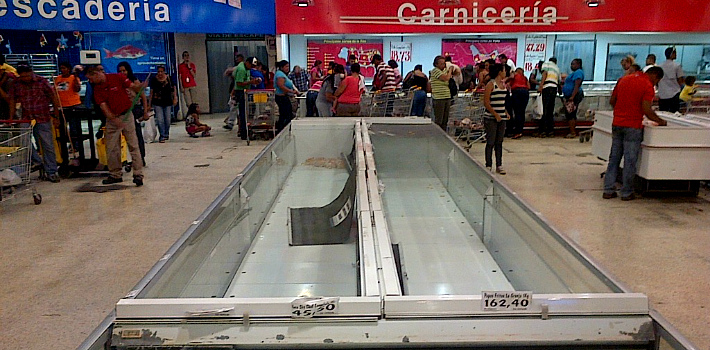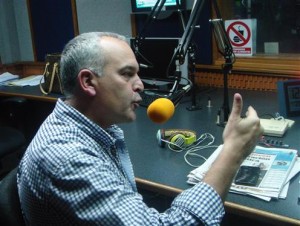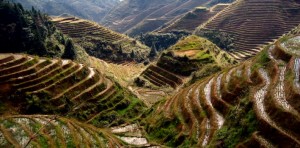
EspañolWhile Uruguay settles its debts with Venezuela at a 35 percent discount, Nicolás Maduro’s government will see its debt increase with an agreement to import 265,000 tons of food.
On Tuesday, July 7, Uruguayan President Tabaré Vázquez announced plans to sign off on debt negotiations with Venezuela on July 17 in Brasilia.
“Uruguay held a debt of roughly US$400 million for oil purchases from [Venezuela’s state-run] PDVSA to be paid over a period of 16 years. We have agreed to pay the debt with a discount of [35 percent], so the money owed by [Uruguayan state-run] Ancap now amounts to $262 million,” Vázquez said.
The president also announced that Venezuela will repay in full the $38 million owed to two Uruguayan exporting companies, as well as another $15 million owed to other private Uruguayan companies. Further, Uruguay will ship some 265,000 tons of grain, dairy products, and poultry to Venezuela, estimated at $300 million.
Production
According to local Venezuelan media reports, the Venezuelan Finance and Public Banking Minister Rodolfo Marco Torres arrived in Montevideo on July 6 and signed an agreement to purchase 120,000 tons of rice, 44,000 tons of powdered milk, 80,000 tons of soybeans, 9,000 tons of chicken, and 12,000 tons of cheese.

Aquiles Hopkins, vice president of the Confederation of Agricultural Producer Associations of Venezuela (Fedeagro), told the PanAm Post that the Venezuelan government’s strategy to import finished products rather than raw material is a flawed economic policy.
Hopkins says the plan may briefly solve the shortage problems in the country, but will aggravate the situation in the long run.
“If the government does not understand that we must boost domestic food production, then each passing day we will become more and more dependent on imports and get further away from food sovereignty. We’ll never get out from under our scarcity and food shortage problems,” he says.
Hopkins argues that scarcity has left the government no other choice but to rely on imports. He explains that because oil revenue has plummeted, Venezuela’s diminished cash flow has limited the country’s ability to import, therefore perpetuating the food shortages.
“It’s sad to see that Venezuela must import food when we can produce it in the country,” the Fedeagro official says.
As for the Venezuelan government’s deal to import food from Uruguay, Hopkins believes the plan is misguided: “I want to warn that the surface area used for rice cultivation fell by 50 percent this year, because we didn’t have fertilizers or seeds to sow, since the government didn’t import the products we needed.”
Importing finished goods will end up costing five times more than if they were produced locally, according to the official.

Venezuela has stopped producing soybeans since the government imposed a ban on GMO crops 11 years ago, he says. Chicken is a hard to find due to the “absurd price controls” causing producers to work at a loss, and the lack of food available for these birds, Hopkins adds.
The dairy industry is in a similar situation. Milk is no longer produced in the country due to a drop in the number of livestock. Hopkins attributes this problem to a lack of economic policies that stimulate local production, a lack of respect for private property, and the expropriation of productive farms. He also notes there is a shortage of medicine needed to care for livestock.
“As a result of the disastrous agricultural policy, we find ourselves condoning debt and haphazardly importing products in an attempt to alleviate the brutal shortage levels present in the country,” Hopkins says.
“Why would the government import finished products rather than giving us the tools to produce them?”
Indebted Venezuela
Alicia Sepúlveda told the PanAm Post that this ongoing policy of prioritizing imports over local production does little to solve the shortage problem. Sepúlveda serves as coordinator for the Economic-Legislative Observatory at the Center for the Dissemination of Economic Knowledge (CEDICE).
According to Sepúlveda, this debt is an example of politics meddling with the economy. She says the government will continue mortgaging the future, and the next generations will inherit a heavy debt due to “irresponsible fiscal policies.”
The economist argues that the Venezuelan government’s decision to forgive part of the debt owed to PDVSA, and not go after the dollars it desperately needs, reflects a squandering of resources. Sepúlveda says the government could have used those resources to boost food production at home.
Instead, she argues, the government has turned the payment of debts into a sort of barter system, trading oil in exchange for food, when the natural resource would be more highly valued in other markets.
 Versión Español
Versión Español












